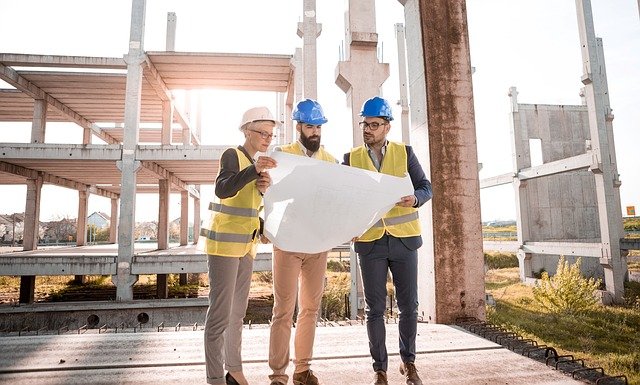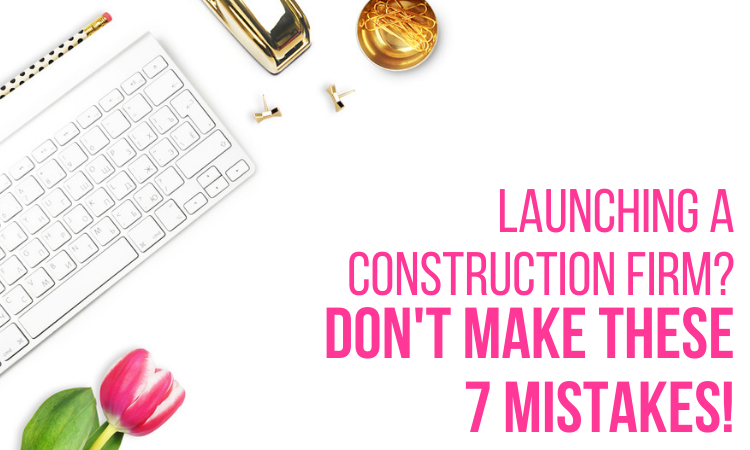You’ve likely already worked as a builder, or in some other area of the industry, if you’ve decided to start a construction company. Each year, many keen entrepreneurs start successful construction businesses. But, there are sadly some firms that don’t even make it past those crucial first 12 months.
This is a contributed post. Please refer to my disclosure for more information.

The last thing you want to do is make some catastrophic mistakes that could sink your new business venture before it’s even had a chance to grow.
With that in mind, you need to ensure you don’t make the following seven common startup construction business mistakes:
1. Forgetting The Best Insurance Products
Insurance is a big deal when you work in the construction industry. As the leader of a business in that niche, you must have the correct insurance cover in place to protect you and your business from any likely issues that may occur now or in the future.
For example, home warranty insurance is a must if your primary aim is building residential properties. It’s also essential to have employers’ liability insurance and professional indemnity cover.
Additionally, insurance to protect any plant equipment and machinery in case of theft or malicious damage is also a must-have.
2. Failing To Check For Local Competition
Do you know how many companies in your local area provide identical services to your construction firm? If the answer is no, you must conduct thorough research before getting your business off the ground.
The last thing you want to do is start a business and find that the local market is oversaturated; in such cases, you’ll need to focus on a niche service or a different location.
Thankfully, it’s not hard to research who else is providing construction services in your local area, thanks to the Internet.
3. Not Having Multiple Raw Materials Suppliers
As with any industry, construction often suffers from supply and demand issues related to raw materials.
It’s no secret that each of your construction projects will have specific requirements, and there is no certainly no “one size fits all” solution you can provide to everyone.
It’s always good to have ongoing links with several raw materials suppliers. Doing so means you will seldom have problems locating specific materials for each construction project.
Without putting much thought into your supplier relationships, your clients are the ones that will suffer the most – followed by your business, if they decide to work with someone else part-way through a project!
4. Ignoring Employment Laws
As the leader of a construction business, you will almost certainly be sub-contracting or hiring people to take care of various aspects of each project.
Are you aware of the employment laws regarding people that work in the construction industry? If you aren’t, now is the time to familiarise yourself with them. Otherwise, you risk facing significant fines and even prosecution in extreme cases!
The good news is you don’t need to stress yourself about the ins and outs of employment law in the construction industry.
The easiest thing to do is to consult with an accountant that specialises in construction, as they can recommend the best legal and tax-efficient ways to hire staff.
5. Avoiding Paperwork
Let’s face it: no one likes dealing with paperwork. It can often be time-consuming to review all sales invoices and receipts for the things you buy and the services you sell.
From a tax perspective, the law says you must keep correct and up-to-date records. Sadly, paperwork isn’t a strong point for many entrepreneurs, including those in the construction industry.
One simple way to avoid that being an issue for your business is by hiring a trusted bookkeeper to ensure you have accurate records for all your business transactions.
6. Being Unprepared For Health & Safety Issues
In the United Kingdom, the fatal injury rate for people working in the construction industry is around one person for every 100,000 workers. What’s more, around 74,000 workers become ill during work on construction projects.
Health and safety is a core aspect of any construction firm and it’s a topic you need to prioritise at all times with your startup business.
7. Not Having Reserve Finances
Lastly, there will be times when you don’t have many construction projects available. During those quiet periods, will you have enough money in the bank to sustain yourself and those dependent on you, such as employees and family members?
If the answer is no, you must work on a “survival” plan to ensure that your business is sustainable and won’t jeopardise your financial future or those of people dependent on you.



